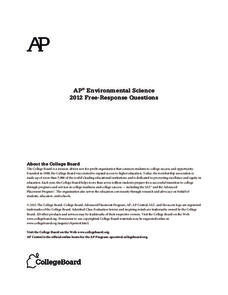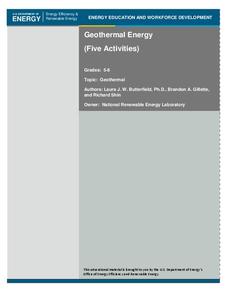Curated OER
Food Web II
Young ecologists are shown a picture of eight animals and two plants. On another piece of paper, they are asked to construct a food web that includes the animals pictured. They must also identify the producers, consumers, herbivores,...
Simply Worksheets
Food Chain Categories
For this food chains worksheet, students fill out the food chains listed with the correct consumer and producers. Students fill out 4 food chains total.
Serendip
Food, the Carbon Cycle and Global Warming
As the world population increases, demands on the carbon cycle also increase. A well-designed lesson first explores the greenhouse effect and its impact on global warming. Further sections have pupils study the effect of greenhouse gases...
Baylor College
Safe Food Preparation
Who doesn't love ice cream? Make this delicious dessert with your class while learning about food preparation in the tenth lesson of this series. Teach about the importance of cleanliness and proper cooking techniques in order to avoid...
Baylor College
Food for the Brain
With a couple of neat diagrams on student handouts, your life science or health class will examine the contents and serving sizes of healthy foods. They dissect a slice of pizza and scrutinize the nutritional value of its components in...
University of California
You Are What You Eat: Testing for Organic Compounds in Foods
We have all heard that we are what you eat, but what are we eating? An informative lesson opens with a discussion of the foods pupils have recently eaten. Then, young scientists perform four experiments on seven different foods to...
Curated OER
Food Chain Checkers
Young scholars model the food chain. In this activity, students play a game resembling checkers that simulates the food chain within the ocean. Young scholars make changes to the game to better represent how the food chain operates.
College Board
2012 AP® Environmental Science Free-Response Questions
Sometimes solving one problem leads to another. Scholars respond to questions about fracking to harvest natural gas and other environmental related topics. The resource provides items released from the 2012 AP® Environmental Science exam...
Curated OER
Sustainable Agriculture: Soils And Food Production
Ninth graders recognize differences in soil quality from one area to another. They describe the importance of organic matter in soil health and suggest ideas that help provide adequate food supplies for the world. The interview a person...
Curated OER
Enzymes Help Us Digest Food ~ Introduction to Sugars and Enzymes
After an explanatory introduction to sugars and enzyme activity, biochemists discover whether lactase is needed to digest lactose, sucrose, and milk as a whole. High school science lab skills are required for these investigations.
Learning Games Lab
Understanding Water Activity
How does water activity play a role in food spoilage? First, the learners think about which types of foods would be best to take on a backpacking trip based on the water activity of different foods. It then walks through why water...
Wildwood Trust
Habitats
The circle of life is all around us, from the black bears in the nearby mountains to the pile of dead leaves in the backyard. Encourage young scientists to take a critical look at the world around them with a set of lessons about natural...
Purdue University
Food Waste Solutions
Easy doesn't always mean better. In an era with pre-packaged everything, learners consider the environmental impact of the convenient trend. They critique the packaging of food and how waste impacts cost and then look for solutions.
Curated OER
Soybean Science
Fourth graders explore food science by participating in a cooking activity. In this soybean oil instructional activity, 4th graders listen as the teacher gives them a background on soybeans and their use by humans today. Students grind...
Curated OER
Fantastic Foods
Students explore the health benefits of dark chocolate. They research other foods which they consider to be both healthy and delicious for a "classroom pantry."
Curated OER
Food Webs
Sixth graders discuss and describe consumers and producers. They discuss and describe predator-prey relationship. Students review food chains. They form a circle, and each student is given an ecosystem card. Student at the top is given...
Curated OER
Food Chains
This simple collection of slides depicts four different food chains, including one for a freshwater habitat. Ideal for primary science learners, the slides employ a combination of photographs and graphics of the sun, plants, and animals....
Curated OER
Food Choices The Pyramid Way
Learners develop skills in making nutritionally-sound food choices. Keeping a food diary, they analyze their food intake using the food pyramid as a guide. Students identify and explain the relationship of nutrition to personal health...
Consortium for Ocean Science Exploration and Engagement (COSEE)
Arctic Smorgasbord
Though the walrus spends roughly one third of its time on land, it eats organisms that live on the bottom of the ocean. The first in a series of five, the lesson uses a variety of plant and animal cards to have scholars build an arctic...
Captain Planet Foundation
Energy Flow in the Garden
How can you tell what an owl has eaten? Study the food chain and flow of energy in an ecosystem by dissecting an owl pellet and noting the bones found inside. Additionally, the lesson plan includes a game about consumers and producers...
US Department of Energy
Geothermal Energy
With Earth Day quickly approaching, as well as many science fairs, why not challenge your class to investigate geothermal energy or other renewable energy resources? There are five driving questions explored in depth here, as well as...
Intel
Starquest
Almost every ancient culture observed the stars and saw pictures in the patterns. Studying stars allowed them to guide travelers, determine when to plant crops, when to harvest food, and the stories surrounding the images include some of...
Consortium for Ocean Science Exploration and Engagement (COSEE)
Understanding the Food Web
Building on prior knowledge of the pervious lesson in the series, pupils explain the previous lesson to each other. Then they write a simple guide for a young child to read on the same topic.
Curated OER
Owls: Top of a Food Chain
Although written for middle schoolers, there is no reason that a 3rd, 4th, or 5th grader could not also learn about food chains through the dissection of owl pellets. After you introduce the topic, learners complete an owl research...
Other popular searches
- Science Project Food
- Science Animal Food Chain
- Food Science Experiments
- Food Science Vocabulary
- Food Science Careers
- Consumer Science Food
- Spanish Food Science
- Simple Food Science
- Food Science Service Project
- Food Science Nutrition
- Nutrition and Food Science
- Food Science Lesson Plan

























